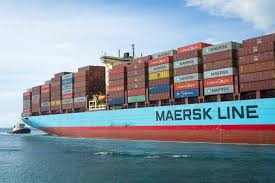Even though it exceeded third-quarter earnings projections, shipping company Maersk warned on Wednesday of waning demand for logistics and transport as a worldwide recession looms and lowered its prediction for container demand this year.
According to Chief Executive Soeren Skou, “it is apparent that freight prices have peaked and have started to stabilize over the quarter, driven by both falling demand and alleviating supply chain congestion.”
At 08:39 GMT, the company’s shares were down 4.4%, having lost 38% of their value since reaching a record high of 24,920 Danish crowns on January 13.
The Copenhagen-based business, one of the largest container shippers in the world with a market share of about 17%, is frequently used as a gauge of world trade.
“There are lots of gloomy clouds on the horizon with the war in Ukraine, an energy crisis in Europe, high inflation, and a potential global recession,” Skou added.
According to Maersk, the worldwide container demand would decline by 2% to 4% this year due to an ongoing economic recession that is anticipated to last through 2023. Its earlier forecast called for a result that would fall between minus 1% and plus 1%.
While these rates have now decreased, shipping containers still cost more than they did prior to the epidemic. During the pandemic freight rates spiked in tandem with increased consumer demand, causing congestion in ports and delays.
Even if spot rates are declining, Maersk still expects its average contract rate to be higher this year than it will be in 2021, even though that rate is $200 per container less than it anticipated in August, according to presentation materials.
Core earnings are expected to decline by around 40% in the fourth quarter compared to the third, according to the projection, analysts at J.P. Morgan wrote in a note to clients.
“The significant question remains the considerable level of uncertainty on mid-term profitability,” they declared.
Maersk’s earnings before interest, taxes, depreciation and amortization (EBITDA) increased from $6.94 billion to $10.86 billion between June and September of last year, exceeding the $9.78 billion analysts predicted in a survey compiled by the firm.
Although the number of containers it carried onto ships decreased by 7.6% from a year earlier, revenues increased by 37% to $22.77 billion.
The business reiterated that it anticipates $37 billion in underlying EBITDA for this year.

















